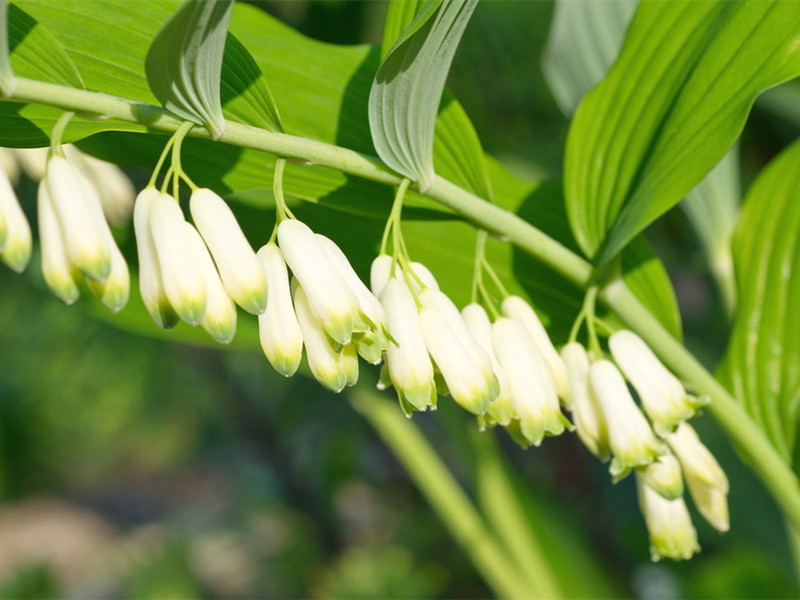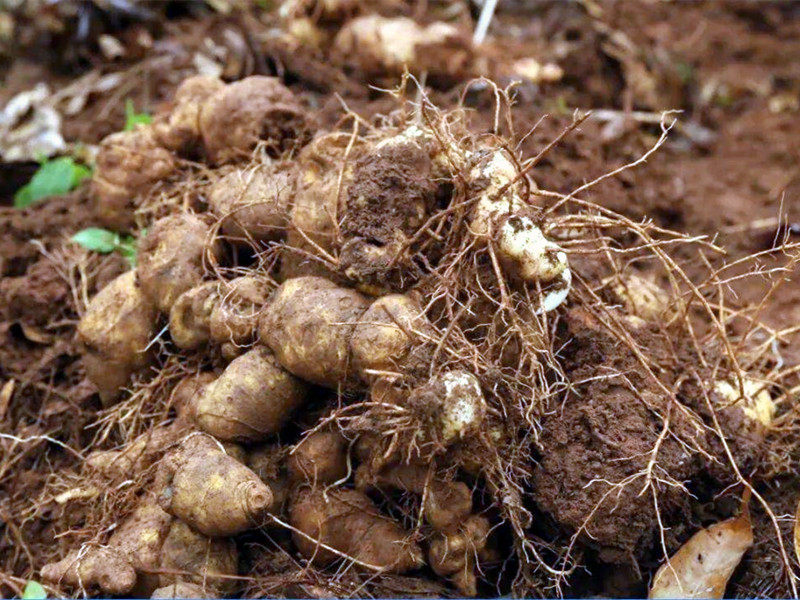Solomon’s seal (Huang Jing) is the common name of several species of Polygonatum, including P. odoratum, P. biflorum, and P. virginianum. Polygonatum is a genus of flowering plants in the family Liliaceae. There are about 70 species, most of which are native to Asia, with a few species found in Europe and North America. Polygonatum plants are herbaceous perennials with slender stems and long, oval leaves. The flowers are small and white or greenish-white, and are borne in racemes or panicles.
Solomon Seal Rhizome is an herb that is often used to strengthen the immune system in Traditional Chinese Medicine. It also used to treat respiratory issues, blood circulation problems and gastrointestinal discomfort. It is also known for its ability to help the body heal from joint injuries and diseases. It is also an effective treatment for pulmonary conditions such as tuberculosis and coughing with phlegm. In addition to this, Solomon seal extract can help to prevent scurvy by boosting vitamin C levels. It can also be used to treat skin and hair issues. It can soothe sunburn and is very effective in treating severe bruising. It can also be used to treat boils, hemorrhoids, and other inflammatory skin disorders. Here are some of the potential health benefits of Polygonatum plant:

Polygonatum
Solomon Seal is also a natural anti-inflammatory
Polygonatum extracts have been shown to have anti-inflammatory effects in vitro and in animal studies, which suggests that they may be beneficial for conditions such as arthritis, asthma, and inflammatory bowel disease. In TCM, solomon’s seal is referred to have the ability to nourishes the blood and acts as a general tonic for all yin tissues, can be used for any kind of musculoskeletal support, as it soothes inflammation and builds flexibility in the joints. It is also a diuretic and mild laxative, and helps to reduce congestion in the intestines. These lubricating properties help to ease pain in the joints and soften tendons, ligaments, and cartilage. It is also helpful in healing and strengthening the tissue that connects bones, tendons, and muscles. It also has the ability to repair and rebuild cartilage and tendons. This is especially useful for people with back problems, as it provides relief from pain, inflammation and stiffness caused by osteoarthritis or repetitive stress injuries.
Solomon Seal extract has Antioxidant effects
Polygonatum extracts contain antioxidants that can help protect cells from damage caused by free radicals. This may help to reduce the risk of chronic diseases such as heart disease, cancer, and neurodegenerative diseases. It also encourages emotional flexibility and supports a strong immune system.
Solomon Seal extract has Immunomodulatory effects
Polygonatum extracts have been shown to have immunomodulatory effects, meaning that they can help to regulate the immune system. This may be beneficial for conditions such as autoimmune diseases and allergies. It contains convallarin, which is an anti-diabetic that increases the body’s metabolism and lowers glucose levels. It acts as an expectorant and demulcent to clear out the lungs of congestion and soothes throat irritation. It also treats dry coughs. Its mucilaginous components also help in preventing the growth of harmful bacteria that cause infection.

Solomon’s Seal
Solomon Seal extract has Nervous system effects
Polygonatum extracts have been shown to have nervous system effects, such as improving cognitive function and reducing anxiety. This may be beneficial for people with conditions such as Alzheimer’s disease, dementia, and anxiety disorders. The herb is particularly effective when combined with other adaptogenic herbs such as ginseng, vervain, and arctic root.
In TCM Solomon’s seal is considered a tonic herb that replenishes the body’s qi and blood. It is also a mild laxative that helps with constipation and acts as an expectorant to remove phlegm from the lungs easing chest congestion and cough. Polygonatum plants are generally considered safe when used in moderation. Acts as a diuretic and mild laxative, solomon seal increases the secretion and flow of urine in the body, thus removing excess water and toxins from the system. However, they should not be used by pregnant women or people with kidney disease. It is important to note that more research is needed to confirm the potential health benefits of Polygonatum. If you are considering using Polygonatum for medicinal purposes, it is important to talk to your doctor first.
- Dandelion Extract: What It Is, Benefits, Uses and Side Effect - April 23, 2024
- Is Berberine Extract Help For Weight Loss? - April 11, 2024
- Why Is Pysllium Husk Powder A Popular Meal Replacement Ingredient? - April 3, 2024


